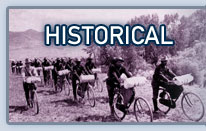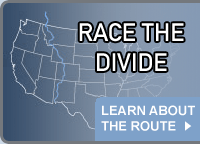TD Rule #2 FAQs
Rule 2 reads...
To complete Tour Divide a rider may resupply food/equipment, rent a room, launder clothing, even service their bike at shops along the way. The intent is to ride UNsupported between towns, and function SELF-supported when in towns. Any services utilized must always be commercially available to all challengers and not pre-arranged[1]. No private resupply, no private lodging.
Tour Divide strives to be an 'equal opportunity epic'. Whether doing an Individual Time Trial or tackling a Grand Départ, TD requires that every rider—from those living along the route to those living on other continents—have an equal playing field. Therefore, outside assistance[2] with navigation, lodging or resupply (especially receipt of supplies from a non-commercial shipper) is prohibited. Visitation: Divide racing is not intended to be a spectator sport, however, route-town locals ONLY may interact with (i.e. visit briefly, cheer on) TD thru-racers in their locale. Out-of-town visitation to the GDMBR mid-race from challengers' family or friends—even if only a 'loosely-planned', remote possibility for rider rendezvous—is prohibited.
endnotes:
[1] Pre-arranged is defined as prior to the start of the race clock. It refers to arrangements like motel reservations or special orders of parts or food
[2] Outside assistance is defined as any third party assistance in navigation or lighting and any non-commercial assistance in food resupply and/or lodging. A service is deemed 'commercial' when it is for commerce, equally available to all racers (ITT + group-starters) year after year, preferably listed in the 'services' guide on ACA Route maps.
FAQs: If you have a question re. Rule 2 not answered below, post it using the comment form







Comments
Question regarding Tour Divide Rule #2
Can I (the racer) ship items to a commercial address prior to the clock starting? - Or would this be considered "pre-arranged" (even though this is available to every racer)?
Answer:
The short answer is, "No". Please see Rule #5 for more explanation.
Basically, no caching supplies along route in advance of start EXCEPT to US PO boxes (only).
Generally speaking, sure, commercial addresses on route are equally available to all challengers, however, pre-race caching of supplies to just any commercial address (ex: diner or motel) is an 'unintended use' of that commercial service. Unintended use (abuse) over time will strain the system designed to serve hundreds of GDMBR thru-riders annually. Therefore shipping to commercial addresses is only allowed in the event of an emergency (once the race has started). Past examples of emergency shipping: toasted derailleur, destroyed wheel/tire, broken pedal, seized BB, lost glove, hat, armwarmer, leg transplant, etc.
3 questions
1) Hostelers Gary and Patti in Del Norte are listed in the Services Directory of the map as offering basic bike repair and camping. Should they choose to offer a room/shower/food, as they have done in the past, can we accept or are we limited to the services as listed in the Directory?
2) Trail Magic. Any limits?? People in the past have accepted beds and meals but this seems to be a bit much to me, although there is a time penalty for accepting this kind of help. Others have gone around begging food.
3) What can a rider offer to do for another rider? Endnote 2 seems to say navigation and lighting help only.
Sorry if this seems nitpicky, just that past practice has been pretty loose.
Re. 3 questions
3 questions
Submitted by Bob on April 21, 2010 - 6:38am.
Q: Hostelers Gary and Patti in Del Norte are listed in the Services Directory of the map as offering basic bike repair and camping. Should they choose to offer a room/shower/food, as they have done in the past, can we accept or are we limited to the services as listed in the Directory?
A: A legitimate commercial service may extend or curtail its range of products at any time. Commercial = for revenue, sustainable enterprise, preferably listed in the Services section on the respective ACA map.
Q: Trail Magic. Any limits?? People in the past have accepted beds and meals but this seems to be a bit much to me, although there is a time penalty for accepting this kind of help. Others have gone around begging food.
A: TD defines trail magic as an inconsequential amount of serendipitous support from a bystander as the Divide racer carries on the normal business of pedaling to Mexico. If this means water, fill your bottles once. If food, accept a snack--not a full day's resupply. If borrowing a tool for maintenance or repair, remedy your issue and pedal on. If offered a bed or shower, decline and take the porch or a barn.
Note: TD differentiates between non-commercial lodging (i.e. indoors, electricity, heat, shower, bed) and non-commercial, out-of-doors shelter (i.e. covered area, barn, etc.) that may facilitate a normal racer bivy. Shelter OK. Lodging not OK.
Again, legitimate trail magic is serendipitous. A bystander is a chance participant only. This excludes anyone who follows Divide racing.
Q: What can a rider offer to do for another rider? Endnote 2 seems to say navigation and lighting help only.
Any guidance yet on this
Any guidance yet on this question:
What can a rider offer to do for another rider? Endnote 2 seems to say navigation and lighting help only.
Thanks. I wouldn't want to be a jerk by not loaning a pump, tool, or candy bar but I also wouldn't want to be relegated for doing so.
Outside Visitation
As one of the records is held by someone who spent two nights with a significant other, shouldn't that record be invalidated or at least asterisked? Even when it happened last year I thought it was a bit beyond the spirit of the race. If the rule that prohibits this was passed after the race, then those following aren't playing by the same rules.
Re. Outside Visitation
Anon, TD appreciates your concern for fairness. It's a large part of what Divide racing is predicated on. The racer you speak of was playing by the established rules in that race-year.
Rules evolve and addenda are born from new scenarios presented annually, but it's not fair to retroactively apply new rules to old editions of Divide racing. When inequity is exposed, we process it, learn from it and decide if TD moves forward with a stricter or more focused rule. That's the nature of self-support racing. The goal is always to have fewer rules, not more, but human evolution doesn't seem to support that.
Editorial: It is doubtful that time spent with loved ones during such an extreme event has ever made anyone 'faster', nonetheless, we are disallowing outside visitation (especially overnight visitation) going forward.
It seems pretty apparent that
It seems pretty apparent that many of these rules have been seriously bent if not broken by past racers. They have even blogged about it. So why suddenly get all draconian about this one thing? Weird.
the above rule speaks about a
Anon, the above rule speaks to a number of 'don'ts'. forgive us, but you'll have to clarify which element you consider too draconian? Again, the rules were originally designed to be as sparse as possible. As time goes on, myriad scenarios present themselves and we deal with them as we can. no ruleset remains perfect through the growth and evolution of a competition.
Limitations on Spectators
Rule 2 states: "Emotional support: Only route town locals may visit with, cheer on thru-racing TD riders. Out-of-town visitation to the GDMBR mid-race from family or friends--even if only a remote possibility for rendezvous--is prohibited."
This seems to discourage race fans or followers (unrelated to any racers) from watching along the GDMBR. Am I to take this literally? If I happen to be riding or packing in the area of the race, coincidental (or even intentionally) to the racers passing, am I somehow "interfering" with the race? Seems you could be a bit better in the PR area, admins.
This is correct
We're sorry if this seems like bad PR but Tour Divide is ultimately for the racers themselves, out there on solo journeys. It is not organized for the fans. All that is secondary. First and foremost, we want to avoid the temptation of fan interference. There can be no help for racers; no hand-ups, no water offerings from super fans out on the course. The rule for route locals is, 'look, but don't touch'. Second, TD preaches small footprint on the GDMBR. This applies to everything from how racers tread to what affect even fans may have by coming into an area to 'spectate' the race. Obviously it's small potatoes right now but it may not always be that way. The event grows exponentially in viewership annually.
Again, the race is not really meant to be seen on the ground. As an underground event, it cannot afford to be much higher profile to local land managers than it is today. Fans flocking to the course has the potential to cause problems.
We intend to improve video coverage along the way so viewers have more media to ingest. We hope this will help satiate superfans who do not live along or very near the route.
Please expand video coverage
I would have never been inspired about this race had I not seen the movie recently. Please make sure to expand the video coverage. It adds a lot to inspiration for future racers.
re. please expand vid coverage
Thanks for the comment. TD does have plans to slowly expand video coverage, however, it's important to remember this race is primarily for the racers to lose themselves in a very personal, 'solo' cross-country experience. Coverage for 'fans' and families is secondary and should never become invasive to racers. There's also the issue of limited resources. TD is 100% non-revenue, non-commercial. It takes time and money to document TD along such a vast route. TD has no budget. It's organizers sink thousands of dollars of their own money annually into executing the event.
visitation
Rule #2 seems for the most part hard to defend to me. Here is my understanding of its reasons, some potential complications, a couple of reason against it, and an attempt at a better solution.
1: We don't want to give U.S. citizens or locals an unfair psychological advantage by enabling a lot of visitation for them which wouldn't be available to non-locals (and non-U.S. citizens).
Response: In some ways this rule is *worse* for non-U.S. citizens, many of whom come over with a wife/husband and make the race the focus of their entire trip. It's more painful for them because the partner that would normally be meeting their racer in most of the towns has to go out of their way to ignore their racer for a few weeks while the race is taking place. "Come to the U.S. with me dear, just figure out something to do with yourself for a few weeks in a foreign country without me, but make sure we don't cross paths or I'll be DQ'd."
2: We don't want to attract any additional attention with hordes of fans flocking to the course.
Response: "Hordes of fans"? Like hundreds of fans waiting in, say, South Park for days between each racer to catch 15 seconds of them as they pass by at 10mph? "Hordes" like on Alpe d'Huez in the TdF? This seems fantastically unlikely to ever occur in a race this slow and spread out.
3: We want to keep a small footprint on the GMDBR.
Response: A small footprint on dirt roads that ranchers drive over with pick-ups? A small footprint in the city of Whitefish? It doesn't seem like the footprint compares to the average local motorized vehicle traffic in any given area for the month of June. Talk of "footprint" is usually reserved for trails and genuinely remote areas, not dirt roads and paved roads where vehicles travel, so talk of keeping a small footprint is a little confusing, especially when friends and family will typically want to meet their racer in an area with amenities, i.e., a populated town. But there is the long-term prospect of the very enthusiastic friend or family member driving up and down the entire course cheering on their racer almost constantly. This seems like a legitimate concern and one that needs to be avoided if this concern is part of what was meant by "footprint".
4: We don't want to increase the likelihood of unfair and illegal resupplies from friends and family
Response: This seems like the best of the reasons and a real slippery slope because it'd be very easy for endearing support from friends and loved ones to turn into for all matters of help---food retrieval/preparation, errands, laundry, bike work, etc. And of course there is huge psychological support that one who lacks friends and family present wouldn't get as well.
(4) appears a reason with real weight behind it, as well as the possibility of an "over zealous supporter" (3).
But there are at least a couple reasons *against* the rule:
(1') Actively preventing people who want to show love and support for both a race and those they care about who are racing seems at the very least unfriendly and at worst downright socially demented. Good will is actively been curtailed which, at least as a general rule of thumb in life, it seems we want to encourage as much as possible.
(2') Allowing visitation is not all necessarily beneficial for a racer. There is a very real likelihood of making it harder for the racer to once again leave those he/she cares about after spending time with them in a fragile mental state.
It seems to me that there is a fairly simple possibility for a solution that satisfies almost all of the above concerns. Here it is: Allow visitation, but only in a small number of pre-designated cities, say, one town in each of the four principal states.
This allows the expression of good will (1'); it limits (1) the advantage that U.S. racers have in that it forces both local and non-local supporters into the same limited pre-designated areas; and it satisfies the "footprint" issue (3) because it keeps visitors to the cities (and in addition supports the economies in those cities). It doesn't prevent the problems that could arise from (4) where a supporter uses a visitation to provide extensive illegal aid to their racer. But much prevention could be gained here from being explicit about the need for the racer to not receive such aid (i.e., passing a pitcher of water across the dining table at a restaurant is o.k. but having your husband drive across town to purchase water jugs for you is not o.k.).
Cheers,
russ
Post new comment